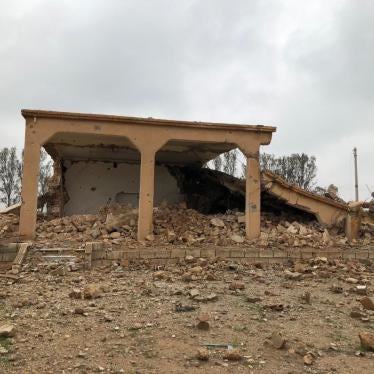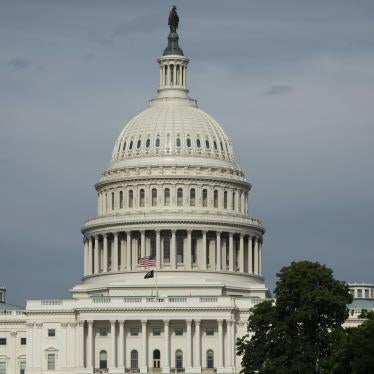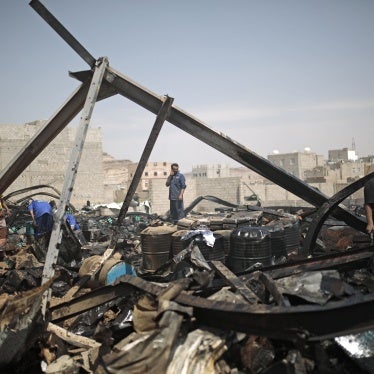J: I told my husband they were going to separate us...
JULIZA: That’s right, open your mouth. The river wasn’t good. It wasn’t deep, but it was pretty wide.
VO: This is Juliza, she’s from El Salvador.
JULIZA: I’m afraid of worms… I remember, I told my husband, “Take off your shoes, I’m going to get on your back!” And he was like, “No, I’m afraid I’m going to drop you!” Because in the river there are slippery rocks. I took off my shoes, rolled up my socks, rolled up my pants to my knees and I told him, “Let’s go.”
VO: Juliza and her husband, Alejandro fled El Salvador after gang members threatened their lives. Alejandro said he’s terrified to ever return:
ALEJANDRO: We’ve seen cases where people returned and they only lasted a day. The next day they were killed or disappeared.
VO:They arrived at the US border in 2019, under the administration of then President, Donald Trump. They immediately turned themselves in.
ALEJANDRO: The first officer did our paperwork, and then they checked it. Another officer approached us and asked what we were doing. He said, “I can tell you right now, you are not going to get through.” They kept [Juliza] there, and put me in a cell.
CLARA: How far along was she at this time?
ALEJANDRO: 8 months.
JULIZA: I asked the cop, “Why are you only processing me, I came with my husband.” He said, “No, your husband is going to stay here. Be thankful to God that you are going that way.”
This is when I learned that they were sending families back to Mexico.
News Clip: The Trump administration implemented it’s Remain in Mexico policy, more officially known as the Migrant Protection Protocols, forcing asylum seekers to wait indefinitely in Mexico...
VO: Under Remain in Mexico, the US forced more than 70,000 asylum seekers to wait across the border while their cases were processed. They were returned to some of the most dangerous cities in Mexico.
JULIZA: I asked the officer if I could say goodbye to my husband,
just to speak to him. And the officer said no.
“You are not going to see your husband anymore.”
VO: Like so many other families, Juliza and Alejandro were separated at the border.
VO: Now, the administration of President Joe Biden has made big promises to undo the policies that have caused so much harm. The future of so many people is at stake.
VO: Juliza came here to Iowa City after she was sponsored by the Catholic Worker Community, one of many faith groups ready to welcome asylum seekers. She’s strong, sincere, and funny. I was 8 months pregnant when I first met her. Family means everything to both of us. Juliza lives here at the Catholic Worker House, where volunteers are helping her build a new life. She’s grateful but afraid. Her husband is almost two thousand miles away, and he’s not safe.
VO: While Juliza waited and prayed for her husband’s safety, her asylum case moves forward.
VO: I joined her for a second check-in with ICE. This team of volunteers came to support her.
In the meantime, Alejandro’s case stalled and he’s still at risk in Mexico. He stays indoors and out of sight as much as possible, afraid of the danger that lies outside.
CWC: Heavenly Father, we thank you for this day….
JULIZA: It was really tough to give birth here and without the support of my husband.
JULIZA: And to this day, we don’t know if he is going to get permission to come over.
Alejandro met his son only once, when he came to a courthouse in Texas for his asylum hearing.
JULIZA: We had the opportunity [when our son was] 4.5 months old to go to El Paso. And for him to meet our son…for 15 minutes.
Juliza: He cried like he was never going to see him again. I knew the goodbye was going to be hard but I have to be strong for my son, here.
ALEJANDRO: I can’t go back [to El Salvador].
And I can’t stop fighting
because I want to be with him
to watch him grow up.
But right now, I can’t.
VO: Just a few months after we filmed Alejandro, he was kidnapped for ransom.
“If I don’t pay the $1000 they are going to kill me.”
“I have already seen them kill people.”
Kidnapping has become the norm for asylum seekers waiting in Mexico.
Juliza was terrified. She didn’t know if she’d ever see him again.
After three months, and severe abuse at the hands of his kidnappers, Alejandro was released.
Now, after nearly two years of being apart, Alejandro and Juliza have a reason to be hopeful again.
President Biden is beginning to allow some asylum seekers with pending cases, about a third of the 70,000, into the United States.
But what will happen to the others?
But there’s still so much uncertainty.
When will Alejandro be allowed in?
When will his family be together again?
The pain people have gone through can’t be undone, but transforming the US asylum system into one that treats everyone with empathy, dignity, and respect will mean that families stay together and people fleeing danger are welcome.










